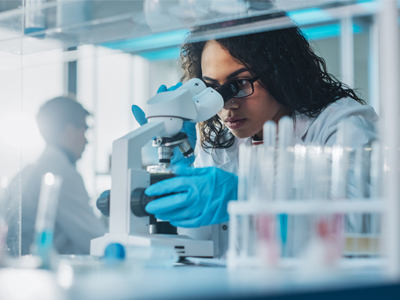Basic and Translational Research
Advancing the study and treatment of urologic conditions
 Our department's largest research program centers on urologic oncology, with a strong emphasis on prostate cancer and bladder cancer.
Our department's largest research program centers on urologic oncology, with a strong emphasis on prostate cancer and bladder cancer.
Faculty investigators explore how androgen receptor signaling drives prostate cancer growth and progression.
In pediatric urology, our teams study adult and embryonic stem cells to advance tissue engineering and regenerative therapies.
See clinical trials at UC Davis »
Faculty Researchers
Allen C. Gao
Gao received his Ph.D. (1995) in Molecular Biology at The University of Texas MD Anderson Cancer Center, Houston, Texas and his M.D. (1985) at Sichuan University West China Medical Center, China. He completed a postdoctoral fellowship (1995-1998) in the Department of Urology and Oncology at Johns Hopkins University School of Medicine in Baltimore, Maryland. Gao served as an assistant professor of urology and pathology (1998-2002) at University of Pittsburgh, associate professor (2002-2006) and professor (2006-2007) of medicine and pharmacology at Roswell Park Cancer Institute and SUNY at Buffalo prior to relocating to the University of California, Davis. The mission of Gao’s laboratory is to understand molecular changes associated with the progression of prostate cancer cells, with the goals of identifying diagnostic markers and potential therapeutic targets for prostate cancer.
Paramita M. Ghosh
Ghosh holds joint appointments with the Department of Biochemistry and Molecular Medicine and VA Northern California Health Care System. Ghosh’s research is focused on signal transduction pathways in prostate cancer development and progression. Her research projects are strongly mechanistic but also utilize human tissues and animal models to prove the effects of various combinations of FDA-approved drugs for the treatment of prostate cancer at varying stages of development.
Eric A. Kurzrock
The pediatric urology research laboratory is focused on the identification, characterization and isolation of urothelial stem cells. Kurzrock received a $785,000 grant from the Department of Defense (DOD) for his Vascularization of Bioengineered Bladder Wall in a Large-Animal Model study. The study proposes to develop bladder grafts with blood vessels engineered from the patient’s own blood-derived stem cells. This is done in a novel way by removing the cells from donor bladder tissue while preserving the architecture to create what is called a matrix, or scaffold. The vessels of the matrix are then rebuilt with stem cells that have been directly injected into the vessel architecture. Additionally, he has received a $389,926 grant from the National Science Foundation (NSF) for Bladder Volume Awareness for Individuals Living with Spinal Cord Injury. The long-term vision of this project is to replace the current time-triggered catheterization regimen with volume-triggered (demand-based) timely catheterization.
Chengfei Liu
Liu is a clinical oncologist and prostate cancer researcher focused on understanding therapy resistance and disease progression in advanced prostate cancer. His work bridges basic and clinical research to develop novel therapeutic strategies, investigating protein modifications, drug resistance, steroid hormone metabolism and tumor immunology. His research spans nuclear receptors, protein modifications, ubiquitin-proteasome regulation, steroid hormone metabolism, pharmacokinetics/pharmacodynamics, tumor immunology and clinical translational studies. He has extensive experience in drug development, clinical trial design, patient-derived tumor models and overcoming therapy resistance. His long-term goal is to uncover mechanisms of resistance in urologic cancers and develop innovative strategies to re-sensitize tumors to effective treatments. He completed his M.D. and Ph.D. at Sichuan University in China and his fellowship in urology and urological research at UC Davis.
Lombard holds joint appointments in the Department of Urologic Surgery and Department of Biochemistry and Molecular Medicine at UC Davis. His lab studies prostate cancer progression, focusing on mechanisms of therapeutic response and resistance. Current research emphasizes integrating PARP (poly [ADP-ribose] polymerase) inhibitors into treatment, developing novel combination therapies and targeting treatment-induced senescence in tumors. Using molecular, cellular and bioinformatics approaches alongside advanced in vitro and in vivo models, his goal is to translate discoveries into more effective therapies for patients. He completed his Ph.D. in biochemistry, molecular, cellular and developmental biology at UC Davis and did his postdoctoral fellowship in urologic surgery at UC Davis.
Lucchesi leads a research group focused on understanding bladder cancer development, progression and drug resistance. His lab studies the impact of environmental exposures and develops advanced 3-D tumor models, such as patient-derived organoid-on-a-chip systems. His research also identifies key cancer-driving protein interactions for therapeutic targeting. He completed his Ph.D. in pharmacology at SUNY Upstate Medical University and a fellowship in oncogenic signals and chromosome biology at UC Davis.

